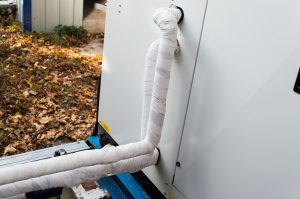 If you discover a leak in a car tire, you go to a mechanic or a tire shop, right? How about a pipe leak? You’d call a plumber. So, what about when you have a refrigerant leak?
If you discover a leak in a car tire, you go to a mechanic or a tire shop, right? How about a pipe leak? You’d call a plumber. So, what about when you have a refrigerant leak?
The thing is, many homeowners think that it’s okay to lose refrigerant—that it’s something that comes natural with the operation of their heat pump or air conditioning system. But in actuality, losing refrigerant is just as detrimental, if not more so, to your air conditioner as losing air in a car tire is to your vehicle.
If you suspect your air conditioner is losing refrigerant, rather than just ignoring it, we urge you to call our pros right away. We’ve given a rundown of why, below.
What Refrigerant Is (and Is Not)
To further explain why losing refrigerant from your heat pump is a problem, we’d like to explain what exactly refrigerant is and what it does.
It serves as a heat transfer medium. There is a blend of chemicals that make up the refrigerant that shift between liquid and gaseous states. This enables refrigerant to easily absorb heat by evaporating and releasing heat by condensing. In your heat pump system, transferring heat form inside your house and releasing it outdoors, or vice versa, is called heat exchange. Refrigerant is what allows this to happen.
Refrigerant is not an energy source. This is a common misconception about this important fluid—that it’s an energy source much like gasoline is to a car. But the heat exchange process doesn’t consume energy—it moves energy. Refrigerant doesn’t contain any energy to power the other components of your heat pump system, and the same level (what we call charge) should stay consistent in your heat pump throughout its entire service life. The heat pumps energy source, alternatively, is electricity.
Since your heat pump is designed to run at a specific refrigerant charge, any change to this will have catastrophic effects on the system.
The Problem with Refrigerant Leaks
The only way a heat pump or an air conditioner can lose refrigerant is through leaks along the refrigerant lines or connection points. Leaks are somewhat hard to detect, but there are definitely signs to watch—and listen—for. For instance, in gas form, leaking refrigerant can make a bit of a hissing or whistling noise, and in liquid form can sound like bubbling. Leaking refrigerant is both a problem in itself and the cause of further problems. These include:
- Ice development along the evaporator coil, preventing the coil from doing its job of absorbing heat.
- Uneven temperatures throughout your home leading to discomfort. You may turn your thermostat up or down depending on the season, only to discover that doesn’t help much.
- Short-cycling—when the heat pump’s compressor turns on and off too rapidly.
These symptoms can point to other issues, and not just a refrigerant leak, but there is one thing they all have in common. They need to be fixed, and by a professional. If you suspect or have been told you have a refrigerant leak, it’s time to give us a call!
When you need service for your HVAC in Sterling, VA, contact AllTech Services, Inc.

